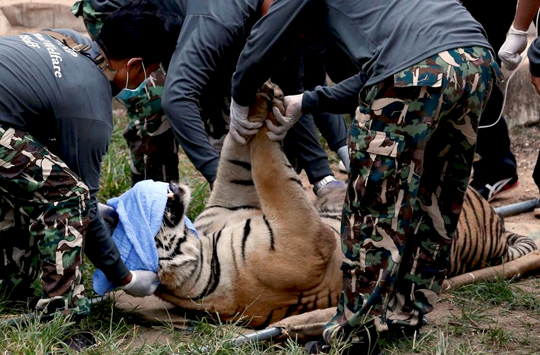Bangkok, Jun 1: Thailand may close down its famed Tiger Temple, popular among Indian and foreign tourists, as wildlife officials have started relocating its 137 tigers, mostly Bengal tigers, amid allegations of illegal trafficking and animal mistreatment by temple authorities.
In the first batch, more than 100 tigers will be taken away from Wat Pa Luangta Bua Yannasampanno, popularly known as the Tiger Temple, said the Department of National Parks, Wildlife and Plant Conservation.
The popular Buddist temple at Kanchanaburi, 140 kilometres from Bangkok, where visitors can pet and take selfies with tigers, started keeping and breeding tigers 15 years ago and has promoted itself as a spiritual sanctuary where wild animals and humans can peacefully coexist.
The temple authorities have been accused of being involved in illegal wildlife trade and animal mistreatment for almost a decade by government officials and animal rights activists.
However, the monks who live in the temple grounds deny abusing the tigers or trafficking any animals and refuse to handover animals to authorities as the place earns thousands of dollars a month from tourism.
Suphitphong Phakcharung, vice-president of the Wat Pa Luang Ta Bua Foundation, said the group opposed to the action because the temple had raised the tigers for more than 10 years without a problem.
The Wildlife department's deputy director Adisorn Noochdumrong led the relocation operation himself on Monday armed with a search warrant from a provincial court.
"We are trying to solve problems step by step," he said.
The department hopes to relocate all 137 tigers in seven days. Most of the tigers will be sent to the Khaoson and Khao Prathap Chang breeding centers in Ratchaburi province.
However, due to the temple's attitude, Adisorn admitted that the operation may take longer than seven days.
Tensions were running high at the temple on Monday as officials and temple representatives met. Officials have also found dozens of dead cubs at the temple site.
The temple monks plan to take legal action against the department and ask the court to revoke the search warrant.
Kasetsart University Faculty of Forestry lecturer Anak Pattanavibool said the authorities were right to relocate the tigers because the state was the animals' rightful owner.
"The procedure to keep the tigers at breeding centers is the best choice we can do, because these tigers were raised in captivity and cannot be returned to the wild. Furthermore, many of them are Bengal tigers, which are not native to Thailand," Anak said.
"We cannot give them to a zoo or other countries because they are the government's property, so the government has to keep them until they naturally die," he said.
The wildlife department said seven tigers were given to the temple in 2001 to be raised on behalf of the state and the tiger population rose to the level it has reached today.
However, the officials said the department's attempts to seize the animals were always rebuffed by the temple.






Comments
Add new comment